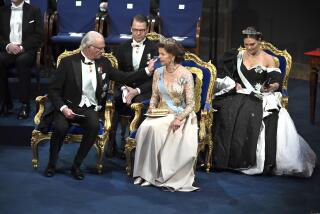Retrospective of Swedish Silents at Melnitz
- Share via
As part of the 350th anniversary of the founding of the New Sweden Colony in what is now Wilmington, Del., the UCLA Film Archives and the Swedish Institute are presenting a retrospective of the Swedish silent films of Victor Sjostrom and Mauritz Stiller, which will be followed by a series of films by Alf Sjoberg.
Sjostrom (1879-1960) is best known for his portrayal of the elderly professor in Ingmar Bergman’s “Wild Strawberries” (1957) and for his direction of Lillian Gish in two of her finest films, “The Scarlet Letter” (1926) and “The Wind” (1928). Stiller (1883-1928) is the man who brought Garbo to Hollywood only to fail as disastrously as she succeeded triumphantly. Both men have always been ranked high as major film pioneers, but this retrospective offers a virtually unique opportunity to see their work.
The films bear out their reputations. To see Sjostrom’s “Ingeborg Holm” (1913), Sweden’s first important feature, is to understand how Andrew Sarris could declare that “it is possible that Victor Seastrom (as he was known in Hollywood) was the world’s first great director, even before Chaplin and Griffith.” For its time, “Ingeborg Holm”--which screens tonight at 7:30 in UCLA’s Melnitz Hall--is amazingly sophisticated in style and technique, revealing that Sjostrom preferred composition to the cross-cutting of Griffith to express relationships and to achieve emotional effects.
“Ingeborg Holm” is preceded at 5:30 p.m. by Sjostrom’s “Terje Vigen” (1917), a stirring and vigorous sea epic based on Ibsen’s poem. Sjostrom, who somewhat resembled his contemporary Francis X. Bushman, plays a brave, naive Norwegian fisherman determined to run the English blockade during the Napoleonic Wars to try to bring provisions from Denmark for his starving family.
“Ingeborg Holm” is followed by “The Phantom Carriage” (1920), based on a novel by the Nobel Prize-winning Selma Lagerlof. This preachy fable about the evils of drink is redeemed by complex flashbacks and stunning visuals in which Death’s coachman appears, making his interminable rounds in collecting the souls of the dead.
Sjostrom’s “The Outlaw and His Wife” (1918), screening Saturday at 7:30 p.m., was hailed by French critic Louis Delluc as “without doubt the most beautiful film in the world . . . It is the first love duet heard in the cinema.” Anticipating “Elvira Madigan” by half a century, this Icelandic saga stars Sjostrom and Edith Erstoff as star-crossed lovers who flee their village and manage to live seven years in the wilderness before fate catches up with them.
All of these Sjostrom films show life as harsh--and society as unjust--as in “Les Miserables” or “Oliver Twist.” Consequently, Mauritz Stiller offers us a pleasant change of pace with his sparkling comedies, “Erotikon” (1920) and “Thomas Graal’s First Child” (1918), which screen Sunday at 7:30 p.m.
No wonder Ernst Lubitsch acknowledged his debt to Stiller. The lavish, large-scale “Erotikon” is an exceedingly sly and witty high society comedy involving an absent-minded professor (Anders de Wahl), his bored, elegant wife (Tora Teje) and her very serious young suitor (Lars Hanson, who was to appear with Gish in “The Scarlet Letter” and “The Wind.”)
“Thomas Graal’s First Child” (1918) opens with a popular Swedish screenwriter (played by Sjostrom) marrying his secretary (Karin Molander) only to quarrel immediately with her over what the sex of their first child should be.
For full schedule: (213) 206-8013.
More to Read
Only good movies
Get the Indie Focus newsletter, Mark Olsen's weekly guide to the world of cinema.
You may occasionally receive promotional content from the Los Angeles Times.









